5 Movies That Changed The Film Industry Forever
In the world of cinema, there are films that not only entertain but also redefine the landscape of movie-making. One such example is the evolution of cinematic techniques, storytelling, and audience engagement through groundbreaking films. This article delves deep into five movies that have significantly impacted the film industry, setting new standards and inspiring countless filmmakers.
From innovative visual effects to compelling narratives, these films have left an indelible mark on audiences and critics alike. We will explore their unique contributions, the context of their releases, and how they paved the way for future filmmakers. Additionally, we will provide insights into their box office performances, awards, and cultural significance.
Whether you are a film enthusiast, a budding filmmaker, or simply curious about the history of cinema, this article will offer valuable insights. Join us as we uncover the legacy of these five transformational movies that continue to influence the film industry today.
Table of Contents
- 1. The Birth of a Nation (1915)
- 2. Citizen Kane (1941)
- 3. Star Wars (1977)
- 4. Pulp Fiction (1994)
- 5. The Matrix (1999)
- Conclusion
1. The Birth of a Nation (1915)
Directed by D.W. Griffith, The Birth of a Nation is often regarded as one of the most controversial films in history. Its groundbreaking narrative techniques and use of large-scale battle scenes were revolutionary for its time.
However, it is essential to note that the film's portrayal of African Americans and its glorification of the Ku Klux Klan have sparked significant backlash and discussions about racism in cinema. Despite its negative aspects, the film's innovations in filmmaking techniques, such as cross-cutting and close-ups, influenced future filmmakers.
Key Contributions
- Innovative narrative structure.
- Advanced editing techniques.
- Use of music to enhance emotional impact.
2. Citizen Kane (1941)
Often hailed as the greatest film ever made, Orson Welles' Citizen Kane revolutionized storytelling and cinematography. The film's non-linear narrative and deep focus cinematography were unprecedented at the time.
Welles' portrayal of Charles Foster Kane, a media mogul whose life is explored through different perspectives, challenged traditional storytelling methods. The film's innovative techniques have influenced countless filmmakers and are still studied in film schools around the world.
Key Contributions
- Non-linear narrative structure.
- Deep focus cinematography.
- Complex character development.
3. Star Wars (1977)
George Lucas' Star Wars redefined the science fiction genre and the blockbuster film model. With its groundbreaking special effects and a captivating storyline, it created a new era of filmmaking.
The film's success led to the rise of franchise filmmaking, establishing a template for future blockbusters. Additionally, its merchandising success changed the way films were marketed and monetized, setting a precedent for future releases.
Key Contributions
- Revolutionary special effects and sound design.
- Creation of a vast cinematic universe.
- Innovative marketing and merchandising strategies.
4. Pulp Fiction (1994)
Quentin Tarantino's Pulp Fiction is notable for its unique storytelling style and eclectic dialogue. The film's non-linear narrative and intersecting plotlines broke traditional storytelling conventions, showcasing the potential of independent cinema.
This film not only revitalized the independent film movement but also influenced a generation of filmmakers to experiment with narrative structures and character development.
Key Contributions
- Non-linear storytelling.
- Complex character arcs.
- Influence on independent cinema.
5. The Matrix (1999)
The Wachowskis' The Matrix combined philosophical themes with groundbreaking visual effects, including the famous "bullet time" technique. Its influence extends beyond the action genre, inspiring discussions about reality and consciousness in film.
The film's innovative approach to action choreography and visual storytelling set a new standard for the genre, influencing countless films and television series that followed.
Key Contributions
- Groundbreaking visual effects.
- Philosophical themes in mainstream cinema.
- Innovative action choreography.
Conclusion
In conclusion, these five movies have not only entertained audiences but also transformed the film industry in profound ways. From narrative techniques to visual innovations, each film has contributed to the evolution of cinema.
As we reflect on the impact of these films, it's essential to appreciate their role in shaping the future of filmmaking. Whether you are a casual viewer or a dedicated fan, these movies provide valuable lessons in creativity, storytelling, and the power of cinema.
We invite you to share your thoughts in the comments below. Which of these films had the most significant impact on you? Don't forget to explore more articles on our site for in-depth analyses and discussions about the fascinating world of cinema!
Final Thoughts
Thank you for reading! We hope this article has inspired you to delve deeper into the world of film. Remember, cinema is not just about entertainment; it is a powerful medium that reflects and shapes our culture. We look forward to seeing you again soon!
Is Christie Sides Married? Unveiling The Personal Life Of A Rising Star
Does Greg Gutfeld Have Cancer? Understanding His Health Status And The Facts
Princess Lilibet 2024: A New Chapter In Royal History


